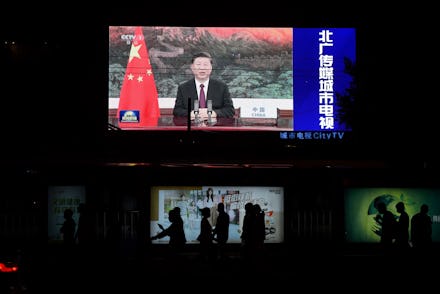China, the world's biggest polluter, says it will be carbon neutral by 2060

A common refrain from Republicans and others who have dragged their feet on pushing the United States toward carbon neutral status is that such action wouldn't change anything since China, the world's largest carbon emitter, wouldn't do the same. On Tuesday, that argument went out the window. Speaking at the virtually-held United Nations General Assembly, Chinese President Xi Jinping made a surprise announcement that China would commit itself to achieving carbon neutrality by the year 2060.
China, which currently accounts for 28 percent of the world's total carbon emissions and contributed 11.4 billion tons of carbon dioxide pollution to the atmosphere last year, plans to reach its emissions peak before 2030. At the start of the next decade, the country expects efforts to get away from dirty-burning fuel sources will see its contributions to the collection of carbon in the atmosphere start to decline. President Xi committed his country to sustainability policies and said China intends to meet the goals established by the Paris Climate Agreement, which has the ultimate goal of keeping the global temperature from increasing by more than two degrees Celsius above pre-industrial levels.
China's promises are a positive development, as it marks the first time the world's current leader in carbon emissions has set out clear goals to reach carbon neutrality. However, the commitment deserves a fair amount of skepticism. None of the nationally determined contributions (self-defined mitigation goals submitted by each country) established in the Paris Climate Agreement are legally binding in any way. So should China decide at some point that it wants to back away from achieving net-zero carbon emissions, it could very easily pull up its stakes and leave other countries behind, similar to how the United States did under President Trump's leadership. Additionally, while President Xi committed the country to working toward these long-term goals, his speech was short on specifics and benchmarks that could be used to measure China's progress.
And China’s current actions fall far short of the rhetoric rolled out by President Xi at the UN General Assembly. The Chinese leader spoke graciously about working to "create a green way of development and life, preserve the environment, and make Mother Earth a better place for all," and said that the coronavirus pandemic should remind everyone that "humankind can no longer afford to ignore the repeated warnings of nature." However, in practice, China has ramped up its efforts to build coal-burning power plants in the wake of the pandemic as an effort to boost the economy following lockdowns.
Kicking the coal habit just might be China's biggest obstacle on the way to achieving carbon neutrality. The country is the largest consumer of coal in the world, and has continued to lean on the cheap but dirty-burning fuel source even as the country has started to expand its renewable energy infrastructure. Some projections believe that the country will build hundreds of new coal plants over the course of the next decade, which could be at odds with its commitment to reducing its overall carbon footprint and achieving peak emissions by 2030.
Still, even with doubts looming, at least China’s leadership is saying the right things. The same cannot be said for Trump, who spoke just minutes before President Xi made his pledge to push China toward carbon neutrality. During his speech, President Trump used climate change only as a means of attacking China. He accused China of dumping "millions and millions of tons of plastic and trash into the oceans," and said "China’s carbon emissions are nearly twice what the US has," both of which are true statements but not the most productive thing to say at an event that is supposed to show a unified front in the fight on climate change.
China has plenty of work to do when it comes to cleaning up its act and dedicating itself to achieving carbon neutral status. The US does, too. It will take dedicated action from both countries to stop the worst effects of climate change. Words aren’t enough, but Trump can't even offer that.